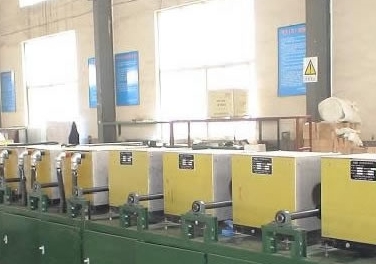- 08
- Feb
How to calculate the power of induction heating furnace ?
How to calculate the power of induction heating furnace ?

Generally, the empirical method is used to estimate the required power density of the forno di riscaldamento a induzione. The required power density of different hardened layer depths for carbon steel workpieces at different frequencies is shown in Table 2-16. The power of the power supply device depends on the power density value (P) calculated in kW/cm² on the surface of the workpiece and the primary heating area A in cm². The choice of power density depends on the heating surface area and its quenching technical conditions. The lower the current frequency, the smaller the diameter of the part and the shallower the required hardening layer depth, the greater the required power density should be. Table 2-16 is the recommended input power density value. When using high frequency and super audio power, P is usually 0.6~2.0kW/cm². When using an intermediate frequency power supply, P is usually 0.8~2.5kW/cm². Deep-hardened layer depth 2-16 carbon steel hardened layer obtained at different frequencies and power densities degrees.
Table 2-16 Hardened layer depth of carbon steel at different frequencies and power densities
| frequenza
/kHz |
Profondità dello strato indurito | Low power density | Densità di potenza elevata | |||
| mm | in | kW/cm2 | kW/in2 | kW/cm2 | kW/in2 | |
| 450 | 0.4 – 1.1 | 0.015-0.045 | 1. 1 | 7 | 1.86 | 12 |
| 1.1-2.3 | 0.045-0.090 | 0.46 | 3 | 1.24 | 8 | |
| 10 | 1.5-2.3 | 0.060 – 0.090 | 1.24 | 8 | 2.32 | 15 |
| 2.3-4.0 | 0.090-0.160 | 0.77 | 5 | 2 | 13 | |
| 3 | 2.3-3.0 | 0.090-0.120 | 1.55 | 10 | 2.6 | 17 |
| 4.0-5.1 | 0.160-0.200 | 0.77 | 5 | 2.17 | 14 | |
| 1 | 5.1 | 0.200-0.280 | 0.77 | 5 | 1. 86 | 12 |
| 6.1-8.9 | 0.280-0.350 | 0.77 | 5 | 1. 86 | 12 | |
| Gear quenching along the tooth profile① | 0.4-1.1 | 0.015-0.045 | 2.32 | 15 | 3. 87 | 25 |
① tooth profile along quenching, in. 3 – 10kHz proposed to use a current frequency of the low power density.
The same hardened layer depth value can be achieved with different power densities and different heating times.
Higher power density and shorter heating time are suitable for lower current frequency; lower power density and longer heating time are suitable for higher frequency. The former heats the surface of the workpiece and conducts less heat to the center part, and the thermal efficiency is higher; while the latter heat conduction is enhanced, and the thermal efficiency is lower. From the perspective of energy saving and that the transition zone of the workpiece hardened layer should not be too thick, the heating time of the surface hardened workpiece should preferably not exceed 10s, and it should not exceed 15s if it is slightly longer , except for special requirements.
Many modern induction hardening machine tools are equipped with energy monitors to control the depth of the hardened layer of the quenched workpiece in kw · S . Therefore, according to the required kW · s value, first set the heating time s, and then use (kW • s) /s to find the required kW value to select the required induction heating furnace power supply rated power value (on the energy monitor kW·s, its kW is generally the oscillation power).
